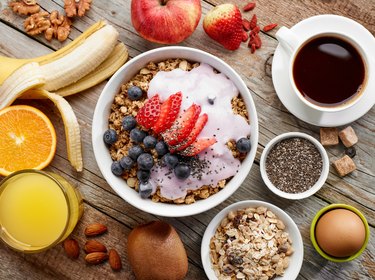
Eating well at all stages of life is essential, but as you age, choosing the right foods becomes even more important. As a 60-year-old woman, your dietary needs are unique, and eating the right foods can help reduce the risk of chronic ailments.
Osteoporosis, heart health, weight control and inflammation are only some of the many concerns that women face as they age and, coincidentally, are impacted by your diet. Food choices can make a huge impact on your overall health and keep you healthier for longer.
Video of the Day
Video of the Day
A Healthy Breakfast to Start the Day
Starting the day off right can give you the edge you need to continue healthy eating throughout the day. It's essential that you consume many nutrients daily, two of which, calcium and vitamin D, are important for bone health. Many traditional breakfast foods, such as milk and yogurt, contain calcium, and vitamin D is contained in egg yolks and fortified milk.
According to the National Institute of Arthritis and Musculoskeletal and Skin Diseases, more than 53 million people have osteoporosis, but consuming calcium and vitamin D may help reduce your risk for fractures. At breakfast, consuming fiber-rich foods, such as fruits and whole grains, also help you feel full and satisfied.
Try a traditional breakfast made from one hard-boiled egg, one slice of whole-wheat toast, a cup of berries and a cup of reduced-fat milk. Or opt for a slice of whole-wheat toast, topped with a tablespoon of low-fat cream cheese, a slice of smoked salmon, tomato slices and olives, and enjoy fortified orange juice on the side.
Read more: Osteoporosis
Nutritious Lunches and Dinners
Whether you eat a separate lunch and dinner or choose to roll them both into one late-afternoon meal, the quality of your food is important. Some women lose lean muscle mass as they age, but including proteins such as skinless chicken or turkey breast, fish and beans can help prevent the loss, according to research published in Current Opinion in Clinical Nutrition and Metabolic Care.
Fruits and vegetables provide nutrients that aid in immunity and supply antioxidants that fight inflammation; in fact, all fruits offer health benefits. Meals rich in fruits and vegetables, whole grains, low-fat dairy and lean proteins also follow the gold standard for a heart-healthy diet.
According to the Centers for Disease Control and Prevention, heart disease is ranked as the number one killer of women overall. A heart-healthy diet is also a healthy diet to follow for prevention of chronic inflammation and diseases such as diabetes.
Eat 3 ounces of boneless, skinless chicken breast with 1 cup each of steamed carrots and roasted potatoes with olive oil, one whole-wheat roll and drink a cup of reduced-fat milk for your dinner. Or try 3 ounces of baked fish, with a half-cup each of brown rice and steamed broccoli on the side. Finish your meal with a cup of strawberries and a cup of water or herb tea.
Healthy Snacking Is Also Important
Healthy snacks are just as important as balanced, nutritious meals. For additional protein and healthy fats, choose walnuts, almonds or sunflower seeds. If you need more fruits and veggies in your daily diet, choose a banana, orange, apple slices, grapes or cucumbers. Step out of your comfort zone and try something new, such as jicama or mango, both of which are nutritious and easy to prepare and eat.
Dairy products, such as yogurt and cheese, is also an excellent choice for snacking and provides calcium and additional vitamin D from fortified milk. Continuing to consume fiber throughout the day — in the form of whole grains, such as oatmeal and plain popcorn, or fruits and vegetables — helps to keep your digestive system healthy.
Read more: Healthy Snacks
Foods 60-Year-Old Women Should Avoid
Foods that can be damaging to the body and actually promote chronic disease should be avoided. Limit high-fat meats, foods high in sodium and sugar, highly processed foods and sugary drinks.
Foods that are highly processed and high in sugar can cause inflammation, which, in its chronic state, has been implicated as a factor in many conditions, including diabetes, osteoarthritis and Alzheimer's disease, according to research published in Aging and Disease.
As a woman of 60, you must understand that diet is one of the most important elements for maintaining your health and well-being, warding off chronic disease and staying at a healthy weight.
Seeking Help With Your Diet
When seeking a change in your diet, it's always helpful to discuss your current medical conditions with your doctor, as many healthy foods interact with medications. As a result, no completely one-size-fits-all diet exists for a 60-year-old woman; it all depends on your current health, nutritional needs and food preferences.
Your doctor may refer you to a registered dietitian to evaluate your current diet and recommend changes that you can make. Calorie needs are determined by height, weight, age and activity level; for additional information as to how many calories you should consume, consult a nutrition professional.
- National Institute of Arthritis and Musculoskeletal and Skin Diseases: Osteoporosis Overview
- Calcium Plus Vitamin D Supplementation and Risk of Fractures: An Updated Meta-Analysis From the National Osteoporosis Foundation
- Current Opinion in Clinical Nutrition and Metabolic Care: Dietary Protein Recommendations and the Prevention of Sarcopenia
- Centers for Disease Control and Prevention: Women and Heart Diesease Fact Sheet
- U.S. National Library of Medicine: National Institutes of Health: Aging and Disease: Exercise, Inflammation and Aging
Is this an emergency? If you are experiencing serious medical symptoms, please see the National Library of Medicine’s list of signs you need emergency medical attention or call 911.